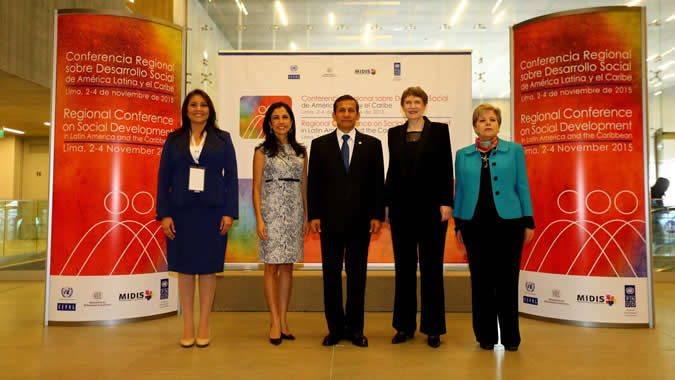Briefing note
Social Development Ministers from Latin America and the Caribbean gathered in Lima, Peru, today to discuss how to continue reducing poverty and inequality despite the region’s economic slowdown, as policymakers start putting in practice the Sustainable Development Goals (SDGs) adopted by world leaders in September 2015.
Authorities partake in the Regional Conference on Social Development in Latin America and the Caribbean (2-4 November) —a crucial social development-oriented high level meeting in the region following the SDGs’ adoption—, which is convened by the Economic Commission for Latin America and the Caribbean (ECLAC), the Government of Peru and the United Nations Development Programme (UNDP).
“Economic growth alone will not reduce inequality. To truly eradicate poverty we must move beyond income aspects alone, focusing on multidimensional assessments that help leave no one behind,” said President Ollanta Humala of Peru, opening the conference.
After a decade of high economic growth and poverty reduction, adding 92 million people to an emerging middle class from 2003-2013, the region is facing slower growth rates and relapses into poverty for some segments of the population. Within this context, participants discussed how to turn the recently agreed 2030 Agenda for Sustainable Development—including the SDGs—into reality, requiring new ways of thinking and taking on complex challenges, like exclusion and inequality.
“A defining feature of the 2030 Agenda is its determination to leave no one behind,” UNDP Administrator Helen Clark said. “This call demands that we work together to identify and address the deep-rooted determinants of exclusion—in this region and beyond. Poverty eradication will only be achieved when we truly invest in people. Growth needs to be both inclusive and sustainable.”
"The Latin America and the Caribbean region has not yet adopted an agenda of social transformation that favors the change from a culture of privilege to an environment in which equal rights enable a sense of ownership in a more integrated society, said ECLAC Executive Secretary Alicia Bárcena, who stressed that strategies for overcoming poverty must consider three main areas: income transfers for immediate relief of basic needs; public access to quality services and labour and productive inclusion.
During the conference, ECLAC will present the main results of the study Inclusive social development: The next generation of policies for overcoming poverty and reducing inequality in Latin America and the Caribbean, which identifies progress and challenges and delivers several policy recommendations. One of the major advances in the report is the increase in social spending in the region, which rose from 13.8% of GDP in 1990 to 19.1% in 2013.
Despite significant progress on reducing poverty over the past decade, nearly 167 million people in Latin America and the Caribbean are estimated to be still living in poverty, according to ECLAC figures. The majority reside in rural areas with limited access to higher levels of education and skills training. Women are disproportionately affected; about 35 per cent of poor people live in female-headed households, according to UNDP’s upcoming Human Development Report for Latin America and the Caribbean on multidimensional progress, which will offer essential policy tools to for a region with a legacy of class, race and gender-based discrimination.
“Social policies must be as strong as economic policies,” said Paola Bustamante Minister of Development and Social Inclusion (MIDIS) of Peru. "This includes investments in health, education and transport, emphasizing the different needs of women and men at different stages of life."
The Minister added that social development means ensuring equitable economic distribution and the necessary investment so each and every citizen can access the same quality services and have the same development opportunities.
Adopting multidimensional approaches to poverty reduction and assessing well-being beyond income measurements is also one of the topics which regional authorities will assess during the conference. This includes improving education, social protection, quality jobs—which are crucial for a region with high numbers of workers in the informal sector—and the acquisition of basic assets, in addition to improving health care and overall living conditions. During the conference in Lima, ministers will also discuss how to include these alternative approaches in a new generation of public policies for the sustainable development era.
Regional authorities are also to discuss challenges for Middle Income Countries (MICs) and Small Island Developing States (SIDS) in the 2030 Agenda, including the need to boost resilience, or the ability to absorb shocks, such as natural hazards or financial crisis, without major economic, social and environmental setbacks.
The Regional Conference on Social Development in Latin America and the Caribbean was created in 2014 during the last session of ECLAC held in the Peruvian capital and is the result of a strategic alliance with UNDP, giving continuity to seven consecutive years of the Ministerial Forum for Development in the region.
Follow the meeting live at the conference’s website: ://crds.cepal.org/1/en
For queries or to request interviews, contact:
ECLAC: María Amparo Lasso, Chief of the Public Information Unit. mariaamparo.lasso@cepal.org; cell phone: +56 9 79678306, +56 22210 2040.
Daniela Estrada, Public Information Assistant: daniela.estrada@cepal.org; cell phone: +56 9 92478224.
Follow us on: Twitter, Facebook, Flickr, YouTube and Google+.
UNDP: Carolina.azevedo@undp.org, Regional Communications Advisor, cell phone: +1 9172083732; karim.capristan@undp.org, UNDP Peru Communications Advisor, telephone: +511 625 9000, #9008.
Follow us on: regional Twitter, Twitter in Spanish and Facebook.
MIDIS: Olinda Merzthal, Chief of General Communications Office. omerzthal@midis.gob.pe; telephone: +51-1-984033195.
Pedro Hurtado, Press Coordinator of the General Communications Office: phurtado@midis.gob.pe, telephone: +51-1-631-8000 #1038 / 51-1-996432428.



